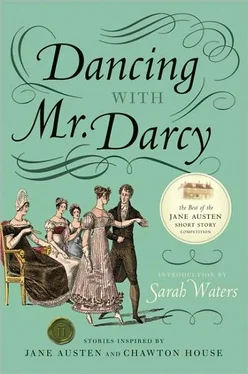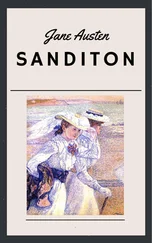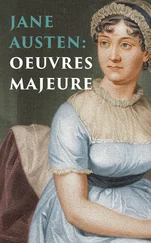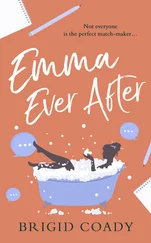He stared at me. My breasts jiggled. ‘Right,’ he said.
He looked disconcerted. A man like me is allowed to be intelligent, a woman is not. A woman especially, if she have the misfortune of knowing anything, should conceal it as well as she can. Northanger Abbey. I experienced a slight thrill at having remembered it all the way through.
Back upstairs, clothes off again. The photographer leers at me, the fat bastard. I reckon I’ve only got a few years left in this. The market’s too competitive now. Magazines, websites, television channels—
‘Only so many punters in this game, only so many wallets,’ the photographer said, in a tone as close as the big ape got to philosophical.
‘There certainly are not so many men of large fortune in the world as there are pretty women to deserve them,’ I said.
He looked perplexed.
‘Mansfield Park,’ I told him. ‘Jane Austen.’
The exam tomorrow. A drafty dusty hall, biros on the desk. I’ll do the rest of the modules, finish the course; pay the fees. Buy the flat, have financial security, spend the rest of my life doing what I want to do. I’ll be too old for it soon anyway, the age of some of the girls coming through. A career where a woman is worthless by the age of twenty-five. It’s a disgrace.
I stretch an arm behind me, arch my back.
‘That’s beautiful,’ the photographer says. He sniggers behind snaggled, cracked teeth. ‘It’s tit-riffic.’
Oh. Yuk. Lord, what fools these mortals be!
My inspiration: Despite the fact that many of Jane Austen’s novels are considered love stories, I think there’s a hard, pragmatic edge in how her characters speak about class and money that is often overlooked. W. H. Auden said that it made him ‘uncomfortable’ to see her ‘describe the amorous effects of ‘“brass” / Reveal so frankly and with such sobriety/ The economic basis of society’. Given this, I wanted to create a character who had this same pragmatic edge about money, in a very modern day context.
The Delaford Ladies’ Detective Agency
Elizabeth Hopkinson
This was going to be a most interesting case, thought Mrs Reverend Ferrars, as her sister, Mrs Colonel Brandon, poured tea for the lady sitting nervously in the small parlour of Delaford Parsonage. So far her talents as a detective had mainly been used to ascertain the true characters of potential suitors or to assure nervous mammas that their daughters were truly engaged (although there had been that unforgettable incident with Mrs Ellis’s chickens). She was looking forward to something a little more challenging.
Of course, it had come as a surprise to her to find she was a detective at all. When she had first arrived in Delaford, she had naturally expected simply to support dear Edward, take baskets to the cottages and raise a handful of plump, well-behaved children. Sadly, the latter had not been forthcoming, and while Mrs Ferrars might envy her sister the third swelling beneath her day gown, she knew better than to brood on what might have been. Occupation was a great comforter, and Mrs Ferrars had found one well suited to her temperament. People had always confided in her (in the cases of Lucy Steele and Mr Willoughby, not always with her willing agreement) and she found she had the kind of sharp mind that relished a puzzle.
‘Pray, make yourself at ease, Mrs Worthing,’ she said, with the reassuring smile she generally used on such occasions. ‘Mysteries, I find, are rather like knots in one’s embroidery thread. They may look impossible, but they always unravel in the end.’
It was important to say something like that, Mrs Ferrars found. Mystery, on the whole, was something she profoundly disliked. It had uncomfortable associations with Gothic ruins and over-emotional young ladies in white gowns. Being able to rid it from the neighbourhood was something that had encouraged her to keep going after the success of her initial case with Miss Morton’s coded Valentine. Detecting was a service to society, and therefore an occupation very worthy of a parson’s wife.
‘Oh, do not mention embroidery thread,’ sniffed Mrs Worthing, dabbing at her eyes with a lace handkerchief. Mrs Ferrars began to suspect her of sensibility or – worse still – sentimentality. ‘Not when a ghostly presence comes each night to my work basket and works on my embroidery – my very own embroidery – while Delaford Park lies in slumber.’
Mrs Ferrars stiffened slightly. ‘Lies in slumber,’ had sealed her opinion of Mrs Worthing.
‘Only think of it, Elinor,’ said Mrs Brandon, helping herself to a Banbury cake behind their guest’s back. ‘All this time I have been living in a haunted mansion. I’m sure I shall never sleep again at the thought of something so horrid. And to think that Colonel Brandon never told me.’
Mrs Ferrars secretly suspected there was nothing her sister would like more than to live in a haunted mansion, but now was not the time to mention it.
‘Oh come, Marianne,’ she said. ‘Colonel Brandon has enough ghosts in his past without bringing them into his house. Have you questioned the other house guests? The servants?’
‘Of course,’ Mrs Brandon eyed the last remaining cake with longing. ‘And they all say the same thing. No one has seen or heard anything. Only the Misses Hart do say they can feel a ghastly chill around the basket.’
Mrs Ferrars sniffed. She could imagine well enough how effective Marianne’s questions had been. She looked back to Mrs Worthing with a twinkle in her eye.
‘You know, you could always take your work basket to bed with you.’
‘And never discover what ails the poor, tortured soul? Oh, Mrs Ferrars, do not suggest such a thing.’
As Mrs Worthing applied the handkerchief yet again, Mrs Ferrars thought of several things she could suggest – a more instructive diet of reading for one thing – but she resisted. It was certainly time for the light of reason to be shed on Delaford Park.
‘Mrs Worthing, leave the matter to me,’ she said.
The house guests at Delaford Park, although unknown to Mrs Ferrars, were not unlike the guests at any country house, and private conversation with each about the embroidery yielded only fantastical supposition on the part of the ladies (Mrs Worthing and her two rather empty-headed sisters, the Misses Hart) or total lack of interest on the part of the gentlemen. These comprised Colonel Brandon, Mr Worthing (who appeared to take no interest in anything beyond coarse fishing and eating) and an army friend of the Colonel’s named Major Black, a pale, quiet man not unlike the Colonel himself. No one was prepared to offer anything useful. They had seen nothing, nor did they have any suggestions as to why Mrs Worthing’s embroidery seemed to have decided to finish itself.
Mrs Ferrars hoped to have better success with Miss Amelia Black, the Major’s sister. There was something in her eye which suggested rather more of quickness than the other ladies, and Mrs Ferrars was glad to approach her in the privacy of the walled garden.
‘Good afternoon, Mrs Ferrars.’ Miss Black looked up and curtseyed. ‘Mrs Brandon has told me all about you. I am most impressed. Generally, if a woman knows anything, she should conceal it as well as she can. To make use of your intellect as you do is a bold thing indeed.’
‘I only make use of it privately.’ Mrs Ferrars did not wish to be thought inappropriate. ‘And only in cases which concern ladies, as with this matter of the embroidery. Now tell me, Miss Black, what do you know? You do not give credence to this tale of a ghost, do you?’
‘Oh, no.’ There was just a hint of something in her eyes as she spoke. Perhaps fear, Mrs Ferrars thought. She had believed Miss Black to be calm and rational when she first began to speak, but now Mrs Ferrars noticed she was plucking at her sleeve, although she kept smiling. ‘Perhaps Mrs Worthing completes it herself, for her own amusement.’
Читать дальше












